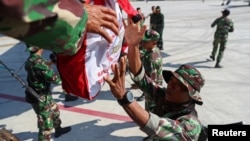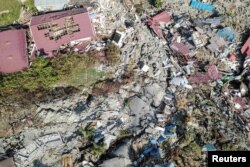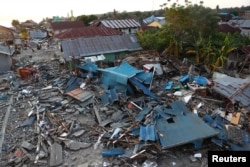Indonesian officials were meeting with the U.S. ambassador in Jakarta Wednesday to discuss assistance for earthquake and tsunami survivors after a day of confusion over whether the country was willing to accept American aid.
Maritime Coordinating Minister Luhut Binsar told VOA by telephone Ambassador Joseph R. Donovan reached out to him on Tuesday to inquire about Indonesia's needs.
U.S. President Donald Trump said at a press conference Monday the United States had "already sent a lot of first responders and military and others" to help Indonesia deal with the impact of the twin disasters.
But doubts were raised about the prospects for relief cooperation when Vice President Jusuf Kalla was widely quoted Tuesday as saying Indonesia had refused an offer of a hospital ship and that military personnel were not needed.
Spokesman Hussain Abdullah told VOA's Indonesian Service "it is not true" that Kalla was rejecting all U.S. assistance, as some media outlets reported.
The vice president's statement "is specifically about [the focus of] foreign assistance for rehabilitation and reconstruction in the long term. Not a military personnel," he said.
Abdullah noted that Kalla had said in earlier remarks to reporters that it "is necessary to ensure that we can use the assistance, so we focus more on foreign aid for rehabilitation and reconstruction the same as it was" after the massive tsunami that hit Aceh in 2004.
Kalla also said emergency assistance is "permissible, as long as it meets our needs."
However he made clear Indonesia had no interest in a visit by an American hospital ship, citing a similar visit after the Aceh earthquake that was of little use.
"No. We don't accept that," he said. "They want to send us hospitals — hospital ships. We have those. Remember our experience in Aceh — only five people were willing to board the hospital ship. "
Luhut, the maritime coordinating minister, said he has already explained to Ambassador Donovan why the hospital ship was not wanted.
"It's true, he offered to provide a hospital ship, I have told him directly we don't need it," he said.
"What we need," he added, "is water purification, an effort to build an anti-earthquake house — that's what we need."
Luhut added that other forms of American assistance, including air transport, are "not a problem."
Other Indonesian officials said Tuesday foreign countries are already offering air transportation assistance, meeting one of the relief effort's greatest needs.
"We will get air transport assistance from other countries," said Wiranto the coordinating minister for politics and security. "And because the runway length is short — a maximum of 2000 meters — then the plane that can land is a large-bodied transport aircraft like the C-130 Hercules."
Wiranto did not say whether air transport assistance would require the involvement of foreign military personnel.
This article originated in VOA's Indonesian Service






